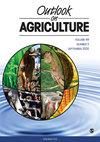了解主要行为者的能力及其在种薯系统中的作用:以厄立特里亚为例
IF 2.6
3区 经济学
Q1 AGRICULTURE, MULTIDISCIPLINARY
引用次数: 2
摘要
了解种子系统的生物物理、社会经济和制度组成部分的综合影响有助于提高种子系统干预措施的有效性。本研究考察了制度因素是否以及如何导致厄立特里亚优质种子马铃薯供应不足,并确定了种子系统中的瓶颈可能在何处以及如何提高种子马铃薯干预措施的效力。研究方法包括与种薯系统参与者的半结构化访谈、与农民和当地专家的焦点小组讨论、对种薯干预计划报告、农场访问报告和其他文献的回顾。该研究确定了一些结构系统故障,阻碍了种子马铃薯干预的有效运作。研究建议包括:(1)投资于气候智能型技术(如集水结构和新品种)以及优质种子生产中心的电力供应;(2)将传统的供应驱动方法转变为需求驱动方法,以使行动者更多地参与种子马铃薯干预;(3)加强行动者的人力技能,以加强不同政府行动者之间的互动和合作制定地方战略以鼓励分散的服务提供系统。长期而言,应考虑到私营部门更多地参与种子和其他投入的采购和供应,甚至作为试点规模的活动。本文章由计算机程序翻译,如有差异,请以英文原文为准。
Understanding the capacity of key actors and their role in the seed potato systems: The case of Eritrea
Understanding the combined effects of the biophysical, socioeconomic, and institutional components of a seed system can help to improve the effectiveness of seed system interventions. This study examined whether and how institutional factors are contributing to the inadequate supply of quality seed potato in Eritrea and identified where and how bottlenecks within the seed systems might improve the efficacy of seed potato interventions. The research methodology included semi-structured interviews with seed potato system actors, focus group discussions with farmers and local experts, a review of seed potato intervention program reports, farm visit reports, and other literature. The study identified some structural system failures that block the effective functioning of the seed potato intervention. The study recommendations include (i) investment in climate-smart technologies (such as water harvesting structures and new varieties) as well as for electricity supply in the high grades seed production center (ii) shifting the traditional supply-driven approach to a demand driven approach for greater participation of the actors in the seed potato intervention (iii) strengthening the human skill of the actors for greater interaction and collaboration between the different government actors and (iv) developing local strategies to encourage decentralized service provision systems. In the longer term, consideration should be given to greater private sector participation in sourcing and supply of seed and other inputs, even as a pilot-scale activity.
求助全文
通过发布文献求助,成功后即可免费获取论文全文。
去求助
来源期刊

Outlook on Agriculture
农林科学-农业综合
CiteScore
5.60
自引率
13.30%
发文量
38
审稿时长
>36 weeks
期刊介绍:
Outlook on Agriculture is a peer reviewed journal, published quarterly, which welcomes original research papers, research notes, invited reviews and commentary for an international and interdisciplinary readership. Special attention is paid to agricultural policy, international trade in the agricultural sector, strategic developments in food production, the links between agricultural systems and food security, the role of agriculture in social and economic development, agriculture in developing countries and environmental issues, including natural resources for agriculture and climate impacts.
 求助内容:
求助内容: 应助结果提醒方式:
应助结果提醒方式:


